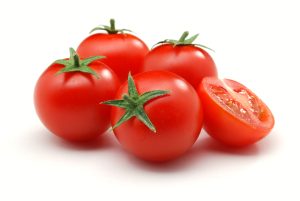Tomatoes (Solanum lycopersicum) are native to South America and are members of the nightshade family. The data is rich in nutrition value. Despite being botanically a fruit, it is often consumed and served as a vegetable.
Tomatoes are the primary dietary source of the antioxidant lycopene, which has been associated with several health advantages, including a decreased risk of heart disease and cancer.
In addition, they are rich in vitamin C, potassium, folate, and vitamin K. When fully ripe, tomatoes are often red, although they can also be yellow, orange, green, or purple.

Nutritional advantages of tomatoes
Tomatoes and tomato-based products are associated with enhanced skin health, a reduced risk of heart disease, and a decreased risk of cancer.
Healthy heart: Heart disease, including heart attacks and strokes, is the leading cause of mortality worldwide.Increasing data from clinical trials indicates that lycopene supplementation may help reduce LDL (bad) cholesterol.Additionally, they have a protective impact on the inner layer of blood arteries and may reduce the incidence of blood clots.
Cancer treatment: Cancer is the uncontrolled proliferation of aberrant cells that invade other sections of the body and expand beyond their natural bounds.
Skin wellness: Tomatoes are regarded as advantageous for skin health.One research found that persons who consumed 1.3 ounces (40 grams) of tomato paste containing 16 milligrams of lycopene together with olive oil daily for 10 weeks had 40 percent fewer sunburn.
tomato nutrition: The question of whether a tomato is a fruit or a vegetable and about its nutrition value has long been debated.

It’s common knowledge that tomatoes are fruits because they originate from the ovaries of blooming plants and contain seeds, making them eligible for classification as such. Tomatoes are often considered a vegetable in the culinary world since they are cooked and presented that way.
Even if you don’t consume a lot of tomatoes, they’re a great supplement to any balanced diet. Vitamin C, lycopene, potassium, and vitamin K are just a few of the minerals and chemicals found in tomatoes that are beneficial to human health.
The nutritional value of tomatoes
16 calories, 0.8% protein, 3.5g carbs, and 0.2g fat are found in a small (2 2/5″ in diameter) tomato (91g). Vitamin C, fiber, and vitamin K are all found in tomatoes.It has a calorie count of 16, 0.2g of fat, 5mg of sodium
- For carbohydrates, there are 3.5 grams.
- 1.1 grams of fiber
- 2.4 grams of sugars are included in this serving.
- 0.8g of protein
- 12.5mg of Vitamin C
- Supplementation with vitamin K: 7.2 mcg
- Carbs: Carbohydrates are found in 3.5 grams in a 91-gram tomato. There are 2.4 grams of carbs from naturally occurring sugars and 1.1 grams of fiber in the total. ” Foods with low glycemic index include tomatoes. Tomatoes, like the majority of other fruits and vegetables, are low in fat.
- Protein: Tomatoes have less than a gram of protein per medium-sized one.
- Minerals and vitamins: Potassium and vitamin C are abundant in tomatoes. Lutein, zeaxanthin, and lycopene are all types of vitamin A found in tomatoes.
- Calories: There are 16 calories in one small tomato (91g), with 73% of the calories coming from carbohydrates, 18% from protein, and 9% from fat.

Summary
Low-calorie, low-fat, and low-glycemic fruits such as tomatoes are excellent sources of water and nutrients. Vitamin C and K, as well as potassium, are all abundant in tomatoes.
tomato nutritional value
Tomatoes, which are native to South America, are members of the nightshade family of fruits and rich in nutritional value. Included in this family are chili peppers, potatoes, eggplant, and other common vegetables. Lycopersicon esculentum is the scientific name for this plant.
This unusual vegetable is cultivated and accessible year-round for eating. Despite being classified as a fruit by botanists, it is widely consumed and served as a vegetable.
Tomatoes are the principal source of lycopene, an antioxidant linked to several health benefits, including a reduced risk of cardiovascular disease and cancer. In addition, they contain an abundance of vitamin C, potassium, folate, and vitamin K.

Tomato Nutritional Properties
Tomatoes are nutrient-dense plant food. Consuming plant-based foods is recognized to be advantageous for a healthy lifestyle, and tomatoes are no exception.
For instance, the risk of heart disease, diabetes, and cancer decreases as the amount of plant-based meals consumed rises. In addition, they are rich in vitamin K, calcium, and lycopene, all of which contribute to bone healing, strengthening, and increased bone mass.
Nutritional Value
The water content of tomatoes is roughly 95%. The remaining 5 percent is composed of carbohydrates and fiber.
- 100 grams of fresh tomatoes contain:
- Calories: 18
- 95 percent of the Earth’s surface is covered by water
- Protein: 0.9 grams
- Carbs: 3.9 grams
- Sugar: 2.6 grams
- Fibre: 1.2 grams
- Fat: 0.2 grams

Tomatoes are also popular due to their antioxidant effects. Antioxidants include:
- Lycopene
- Beta carotene
- Lutein \sFlavonoids
- Phosphoric acid
- Tannins
tomato nutrition data
1 tomato nutrition
In order to supply the nutrition necessary for the body, everyone has to consume 1 tomato every other day. Tomatoes, in general, have a low risk of developing chronic diseases and are an excellent dietary source of the antioxidant lycopene. They are an excellent source of vitamin C, potassium, and vitamin K, as well as folate.
They frequently assert, and with good cause, that too much of something is always undesirable. Tomatoes are used in almost all of our dishes, including the scrumptious gravies, soups, and salads that we make.
Tomatoes, in general, have a low risk of developing chronic diseases and are an excellent dietary source of the antioxidant lycopene. They are an excellent source of vitamin C, potassium, and vitamin K, as well as folate.
However, there are also some adverse consequences associated with consuming an excessive amount of this fruit, which is frequently misidentified as a vegetable.
Tomatoes are technically fruits, not vegetables; this fact should not be forgotten. This potent red ally is loaded with antioxidants and has been shown to be effective in lowering water retention. In addition to this, it helps prevent leptin resistance.

(The protein known as leptin is what stops our bodies from burning fat and maintaining a healthy weight.) In addition, tomatoes have a relatively low calorie content; a tomato of the typical size has just 22 calories, while a larger tomato has 33 calories.
Tomatoes are categorized as a “high-volume” food, which means they contain a significant quantity of air, water, and fiber. Because of this, they are known to reduce hunger.
It ought to be obvious, but burning fat and losing weight are not something that can be accomplished only by consuming these six fruits on their own. When your caloric expenditure is more than your caloric intake, you will experience weight loss.
You will be able to accomplish your target weight if you engage in physical activity and replace foods that are high in calories, such as cheese, pork, or grains, with fruits that are low in calories, such as tomatoes.
- tomato nutrition facts 1 cup
- Nutrition Facts
- Serving Size: 1 cup of chopped or sliced
- Amount Per Serving
- Calories: 32
- % Daily Values*
- Total Fat0.36g : 0%
- Saturated Fat 0.083g: 0%
- Trans Fat: –
- Polyunsaturated Fat: 0.243g
- Monounsaturated Fat: 0.092g
- Cholesterol0mg: 0%
- Sodium 9mg: 0%
- Total Carbohydrate 7.06g: 3%
- Dietary Fiber 2.2g: 8%
- Sugars: 4.73g
- Protein: 1.58g
- Vitamin D: –
- Calcium 18mg: 1%
- Iron 0.49mg: 3%
- Potassium 427mg: 9%
- Vitamin A 76mcg: 8%
- Vitamin C 22.9mg: 25%

* The % Daily Value (DV) tells you how much a nutrient in a serving of food contributes to a daily diet. 2,000 calories a day is used for general nutrition advice.










Your comment submitted.